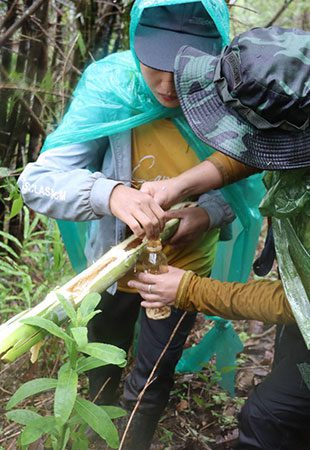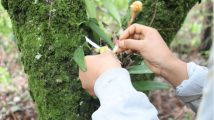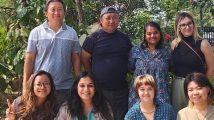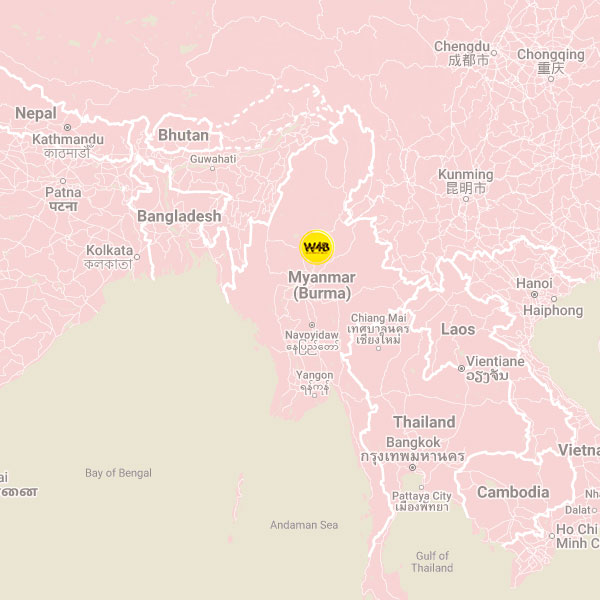MYANMAR
This project will be carried out in Kawthoolei which is the Indigenous Karen people’s homeland in the southeast of Myanmar. Kawthoolei encompasses the Karen (Kayin) state in Myanmar and extends a small amount beyond those borders drawn by the central administration. The Karen state is under the administration of the Karen National Union. Currently, Myanmar is in the midst of a conflict. Although the Karen state has seen conflict for over 70 years, since the military coup in 2021, the conflict has intensified and there are regular airstrikes and ground attacks across different Karen areas. Many are now facing internal displacement or are having to flee regularly from their homes due to airstrikes. During this conflict, and with the threats of climate change Karen communities understand the critical importance of maintaining the rich biodiversity of their ancestral lands, for their food sovereignty, livelihoods, culture, and spirituality, and they continue to reach out to Karen Environmental and Social Action Network (KESAN) for support, and with wishes to continue their work strengthening reliance in their communities.
The Kheshorter forest is located west of Lu Thaw Township, Mutraw (Papun) District and east of Mon Township of Klerlweehtoo (Nyaunglaybin) District of Kawthoolei in Burma. The forest is under the collective governance, protection and management of fifteen (15) indigenous Karen communities living in three village tracts, namely Kay Pu, Ler Mu Plaw, and Saw Mu Plaw of Mutraw District. This project will also involve communities from nearby CFs Lay Kay and Ler Mu Khlo.
Indigenous Karen women typically carry out distinct livelihood and farming tasks and have distinct knowledge and wisdom about biodiversity. For example, women are more likely to place higher value on Non Timbre Forest Products (NTFPs) and herbal medicines than men. Indigenous Karen women often lead efforts to protect and restore ecosystems and species that are vital to their communities’ well-being. Women have important roles and are valuable to communities in distinct ways to men in some Karen communities and yet women’s involvement and leadership in conservation and natural resource governance is often overlooked at a local, regional, and global level. Recognizing and supporting Indigenous women’s role in conservation is essential to achieving sustainable and equitable outcomes for both people and the planet. This project seeks to create opportunities and support women to carry out biodiversity conservation and restoration and highlight the essential contributions of women to the conservation and sustainable utilization of natural resources.

PROPOSED OUTPUTS/OUTCOMES
• To empower and increase the capacities of Indigenous Karen women to contribute or lead biodiversity conservation, management, and restoration in their communities.
• Organising awareness and capacity-building activities, reforestation and women-led biodiversity research.
• To foster greater understanding and engagement amongst communities, community forest, and women’s biodiversity research
• To revitalize indigenous knowledge relating to biodiversity.
• To uphold, celebrate, and raise awareness of Indigenous customary traditions to protect the forest and watershed areas.
• To enhance women’s opportunity and capacity to both record and share indigenous and scientific knowledge on local biodiversity and biocultural conservation.
REPORTS
ARTICLES AND OTHER OUTPUTS

Indigenous Karen women lead in documenting biocultural plant species in the Salween Peace Park
The Salween Peace Park (SPP) spans over 6,000 square km of biodiverse landscape in Mutraw district, Kawthoolei, Myanmar.

Indigenous languages and traditions need to be shared from one generation to another
The Convention on Biological Diversity (CBD) recognizes Indigenous Peoples’ and local communities’ dependency on biological diversity and their unique role in conserving life on Earth.

Meeting with KESAN on January 2024
A short meeting with the KESAN Team in Chiang Mai, Thailand in January. We talked about the ongoing conservation efforts, challenges and the awesome all-female research group that’s leading the process of documenting the bio-cultural plant species at Salaween National Peace Park in Myanmar. Take a look at this short video that encapsulates this day.

[Photo Story] Through Women’s Lenses: A Photo Story on Documenting Biocultural Plant Species in the Salween Peace Park by the Women Research Group
On World Environment Day 2024, let's delve into a photo story about the Women Research Group, which is documenting biocultural plant species within the Salaween Peace Park in Myanmar.
PHOTO GALLERY

OVERVIEW
REGION:
Kheshorter Community Forest
RESTORATION SITE PARTNERS:
Karen Environmental and Social Action Network (KESAN)
ECOSYSTEM:
Montane Evergreen Dry Dipterocarp Forest within the Dawna Tenasserim Landscape
COVERAGE:
5, 911 hectares (strong coverage with some degraded areas)

























